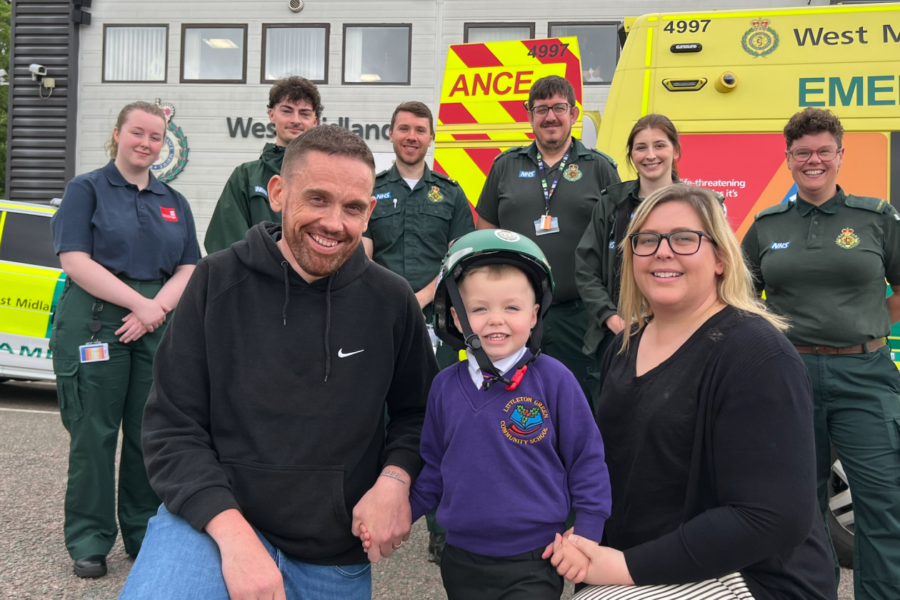
A dad of one who was given a second chance at life after suffering a cardiac arrest has been reunited with his lifesavers at West Midlands Ambulance Service.
Richard Ward, who was just 37-years-old when he collapsed at home on the 8th March 2024, visited Tollgate Ambulance Hub with his wife and four-year-old son on Monday 3rd June 2024 to say thank you to the team of medics who helped to save his life.
Talking about what happened that day Richard, 38, who works as a Carer said: “The last thing I remember is dropping Lucas off at nursery and walking through the front door at home. I apparently had a sausage sandwich and a conversation with my wife Teresa too before I collapsed but I don’t remember any of it.”
The next thing Richard remembers is waking up in the intensive care unit a few days later, confused, asking his wife if he was going to die.
On that Friday morning in March, 38-year-old Teresa was unusually at their home in Cannock instead of at her teaching role which may well have helped to save her husband’s life: “I was upstairs on the phone when I heard a strange noise from Rich downstairs. I went down and found him collapsed on the sofa making a strange gasping, grunting noise. I got straight onto the ambulance service and the call assessor asked if I was alone, which I was, then told me to start CPR.”
Quick thinking Teresa then raced to her neighbours house for help, who is a retired community first responder, and between them they did CPR on Richard until the first ambulance arrived within a few minutes of her making the 999 call.
Stafford-based Paramedic Daisy Morrell was part of the first ambulance crew who responded to Richard and arrived on scene to find him in cardiac arrest. Daisy said: “Teresa was doing very good CPR on her husband. We quickly took over to commence advanced life support and radioed control to request an additional crew and air ambulance support. Between the whole team on scene, we administered 16 shocks to Mr Ward and utilised a LUCAS device to continue mechanical chest compressions. Thankfully we managed to restart Mr Ward’s heart at his home before we took him to New Cross Hospital on blue lights for further care.”
Richard was put into an induced coma and spent three days on ICU, 11 days on a cardiac ward before being discharged home. He was diagnosed with Brugada syndrome and has had a subcutaneous implantable cardioverter defibrillator (S-ICD) implanted.
Daisy continued: “I’ve worked for the service for five years and this is the first time a patient has fully recovered from a cardiac arrest and left hospital. It was really lovely to see Richard and his family. His story is the perfect example of how important early CPR is to a positive outcome and I’d encourage everyone to learn this life-saving skill as you never know who will need your help.”
Richard said: “Someone was definitely watching over me as it all fell into place that day. I feel incredibly lucky too that a device with the same name as my son helped to save my life! I’m very thankful to you all for what you did for me, thank you for saving my life. I wish everyone would learn CPR, it takes 15 minutes to learn and it could save a life.”
Ends.
Photo (left to right top) – Staffordshire University Student Paramedic Alannah Tann, Paramedic Alex Baker, Clinical Team Mentor Iain Slinn, Call Assessor Dan Kemsley, Paramedic Daisy Morrell, Paramedic Jessica Preston.
- A LUCAS Device provides mechanical chest compressions to patients in cardiac arrest.
- An S-ICD is a type of implantable cardioverter defibrillator (ICD) which is an electronic medical device that helps prevent sudden cardiac death. Healthcare providers recommend ICDs for people with certain cardiac conditions to monitor heart rhythm. When the device detects a very fast, abnormal heart rhythm, it delivers a shock to your chest to reset your heart rhythm. This is defibrillation.
- Brugada syndrome is a rare condition that affects the electrical messages which control your heart rate. This causes an abnormal, very fast heart beat which can be life-threatening.
